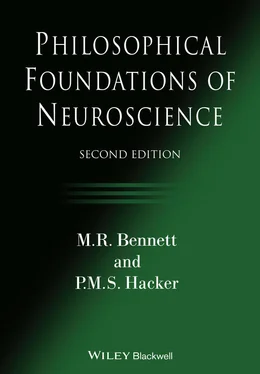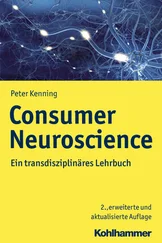Does all this mean that neuroscientists have to study philosophy or to become philosophers? No – there are great swathes of philosophy, such as metaphysics, logic, philosophy of mathematics, or moral and political philosophy that are of no concern to the neuroscientist. Nevertheless, many of the conceptual structures presupposed in neuroscientific research and the specific conceptual forms invoked are, by their nature, highly problematic. For they unavoidably link the conceptually heterogeneous domains of the behavioural, the psychological and the neural. Furthermore, neuroscientists are sometimes required to extend existing concepts or to introduce new concepts for specialized purposes. It is all too easy to do so in inconsistent and incoherent ways. It is desirable that neuroscientists be familiar with connective analytic methods in order to sharpen their sensitivity to conceptual unclarities, errors and confusions. They must be able to realize that, for example, memory need not be of the past, that one cannot order someone to be conscious of something, that if one is conscious of something’ s being so, then it follows that it is so, that something may be voluntary without being intentional or intentional without being voluntary, and so on. They cannot stand aloof from conceptual questions or refrain from committing themselves to conceptual forms.
It will come as no surprise to those who have read the first edition of this book that a spirit hovers over its arguments: the spirit of Ludwig Wittgenstein. Why Wittgenstein rather than Popper (who inspired Eccles ) or even Locke (who inspired von Helmholtz )? Because Wittgenstein’ s reflections on the philosophy of psychology surpass anything previously achieved in this domain of philosophical thought. Our conceptual analyses in this book echo and elaborate Wittgenstein’ s not because we are fond of Wittgenstein but because his intellectual approach in this domain is precisely what is needed by cognitive neuroscience. Philosophy of psychology has to elucidate the conceptual relations between the behavioural and the ‘inner’, ‘mental’ or ‘psychological’. It has to account for the conceptual structures that inform the asymmetries between the first-person utterance and the third-person description of ‘experience’ or ‘states of consciousness’. Wittgenstein broke with a long tradition of conceptual confusion characteristic of both rationalist and empiricist thought, indeed a tradition dating back to antiquity. He ploughed up the field of philosophical thought afresh. Cognitive neuroscience was firmly planted in that field, with roots reaching down to the late fifteenth and sixteenth centuries, as we describe in chapter 1. It has to cope with a subject matter that straddles the behavioural and the ‘inner’, although here the ‘inner’ is neural and cortical. The basic observation statements of the science are what people do and say, and it is these that need to be related to an ‘inner’. Here too there is an illusion that just as introspection seems to bypass behaviour and give one direct access to an ‘inner’, so too positron emission tomography ( PET ) and functional magnetic resonance imaging (f MRI ) give neuroscientists the illusion that they can bypass behaviour and study the ‘real thing’ directly. At last, as one well-known neuroscientist exclaimed, we can ‘actually see thought’. But that too is an illusion. For neuroscientists, the ‘hard facts’ are recurrent and reproducible human behaviour. We can see thought when we watch Le Penseur and hear thought when we listen to a great thinker lecturing, but not when we watch the computer-generated image of an fMRI scan.
Finally, to mention a theme that will recurrently preoccupy us throughout the methodological sections of this book, critics seem puzzled at the idea that examination of language can have anything to tell empirical scientists other than linguists. The puzzlement seems to have two sources: first, the thought that language is trivial, whereas neuroscience is deep; second, that an interest in current psychological or mental vocabulary precludes conceptual and linguistic change. Both are mistaken. Since it is the capacity to speak and the mastery of a language that is a condition of all that is distinctively human, and hence too a condition for the sciences and the arts of humanity, it is hardly appropriate to trivialize what differentiates us from monkeys and rats. Without a mature language there is no formulation of scientific hypotheses and so too no discovery of general truths of neuroscience or of science in general. The scrutiny of the language of psychology and neuroscience will not discover new neuroscientific truths, but it will guard against the inadvertent adoption of incoherent hypotheses and the illusory confirmation of unintelligible neuroscientific conjectures. Language, and the concepts expressed in our languages, are the medium of scientific thought. If one ties knots in the web of words, one can get nothing right, save per accidens – and even should one be so fortunate, one will not understand what one has discovered. Second, that we need to examine our means of representation carefully in order to avoid the manifold confusions to which we are prone does not imply that we are confined to our existing vocabulary and the concepts it expresses. Nothing prevents linguistic stipulation and conceptual innovation. But we must be forewarned to ensure coherence, and to assure that the innovation dovetails smoothly into antecedent usage. Analogical extension needs meticulous monitoring, lest it be stretched beyond the bounds of intelligibility. The step from ‘as it were’ or ‘it is as if’ to ‘it is so’ is far too easy to take, as is patent in the development of talk of dictionaries and concept-stores in the brain. It is self-defeating to appeal to pragmatism, as if experiments could validate analogies independently of laying down verifiable criteria of identity and difference (the extension of hydrodynamic analogies to electricity theory is not self-validating or self-confirming ).
In this book we sketch an overview of some of the most widespread and damaging conceptual confusions in cognitive neuroscience. Almost all the chapters of the first edition have undergone revision and addition, sometimes minor, sometimes major. Some revisions have involved correction of previous error (e.g. phantom pain location), others involve additional explanation and elucidation. Most new sections involve reference to and critical discussion of papers published on the subjects of concern over the last two decades. We provide a handbook that we hope will be of service for neuroscientific research. Above all, we try to exemplify an array of analytic methods of conceptual clarification. These methods require no laboratory space and need no grants. All they require is an open mind, a willingness to raise a question for every answer, and patient intellectual effort. This can save a young scientist from committing his or her life to an enterprise that was doomed to failure before it even started (e.g. the quest for the neural correlates for qualia – see chapter 11– or the search for the locus of the self – chapter 14).
We have added to this second edition numerous figures, charts and tree-diagrams, comparative lists and tables. They are meant to facilitate obtaining an overview of a conceptual domain – providing a synoptic presentation that can be taken in at a glance. They are often no more than illustrations to the argument of the text, not substitutes for it. They sometimes oversimplify for purposes of surveyability. So they should be used with care. With this proviso, we believe that they fulfil a useful function in aiding understanding.
M. R. Bennett
P. M. S. Hacker
Part I Philosophical Problems in Neuroscience: Their Historical and Conceptual Roots
Читать дальше












